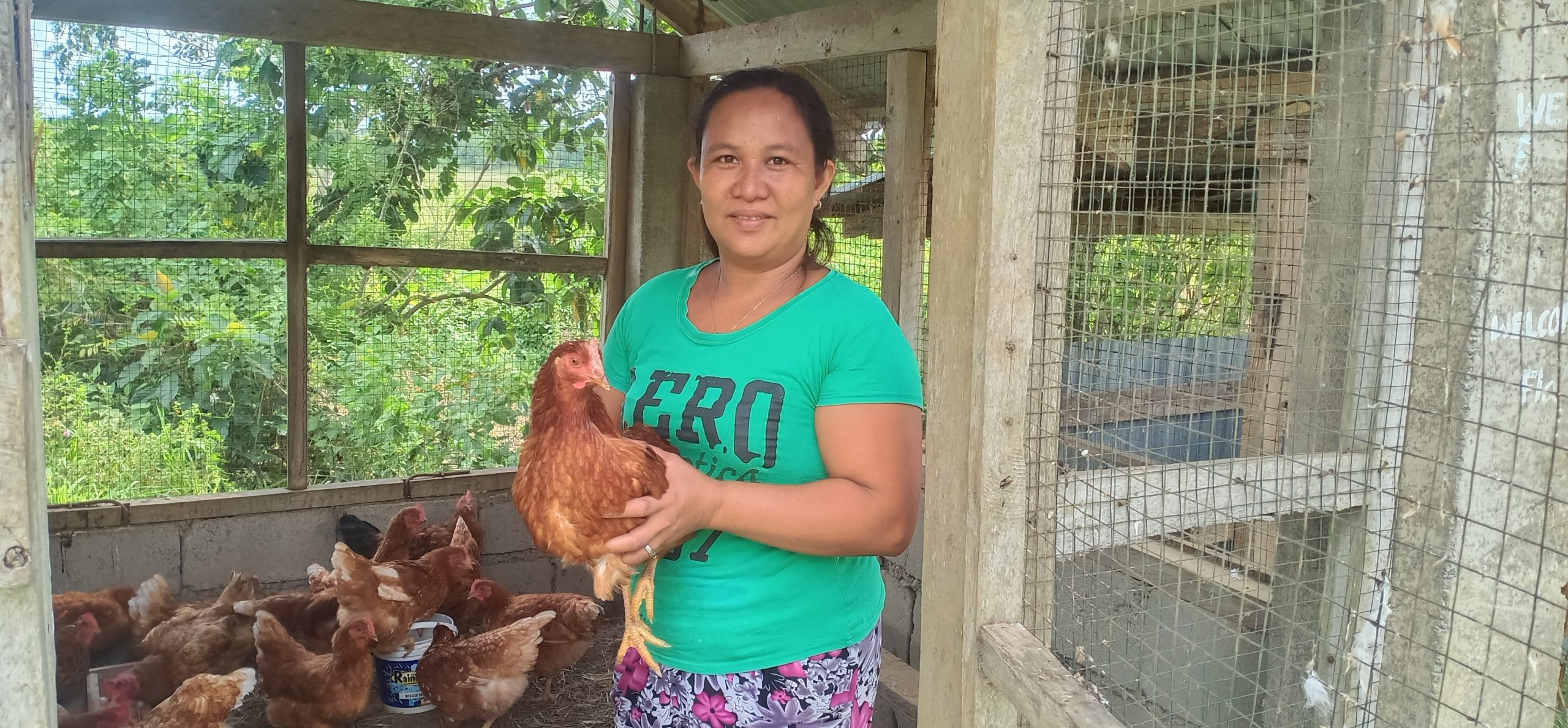APAYAO, November 10, 2022 – After spending 2 years in Lebanon as a housekeeper, former Overseas Filipino Worker (OFW) Airene Purisima decided to venture back into farming upon returning to the Philippines. She currently has a thriving poultry and small food house business and is a beneficiary of the Chicken Egg Production Project of the Department of Agriculture-Special Area for Agricultural Development (DA-SAAD) Program.
The 40-year-old mother of two from Malubibit Sur, Flora, Apayao was raised by farmers and worked as farm laborer at an early age. Driven by poverty, she wasn’t able to pursue her college degree and continued to farm to help her family with their daily expenses.
“Mas pinilik iti agubra iti katal-talunan tapno makatulung nak pamilyak iti gastusen kin adda agserbi nga kanen mi” (I chose to work in the farm instead of pursuing my education to help my family financially and for us to have something to eat daily), Ms. Purisima shared
In 2007, she was married to Angelito Purisima and continued to farm rice while earning at least Php 4,000.00 per cropping season.
“Mano met laeng kit-kitan mi idi, ngem isu nagitaguyod iti agrikultura kadami nga akas pamilya” (We are only earning small amount of cash as farm labourer but I can say that agriculture played a vital role in our life as family), Ms. Purisima shared. She currently has two children who are 18 and 11 years old respectively.
However, due to financial constraints, Ms. Purisima decided to take the opportunity to work abroad as a housekeeper. According to her, when it comes to monetary aspect, it was good to have a stable income, but she also attested that as an OFW, she failed to handle the pressure living away from her family. She added that adjustment is inevitably challenging.
“Kasla nariknak nga awan nam-namakon nga makadwak iti pamilyak. Narigat iti nilab-labasa’k. Narigat nga talaga iti umadayo iti pamilyak” (I already lost hope to be with my family again. It was tough to move away from my family), Ms. Purisima said.
Additionally, she and her husband expressed that they do not want their child to grow without a mother on their side. In 2009, she decided to return to the Philippines to be with her family once again even though she did not have any savings during that time.
Eventually, the couple started to invest in backyard farming. “Nangirugi kami iti poultry tapnon nu kasta ket adda latta pangalan mi sidaen mi” (At first, we started in poultry production for living), shared Ms. Purisima. To further generate additional income, they also capitalized on rice farming with an area of 2,500 square meters.
According to her, life is not easy but there is hope agriculture. “Uray kasanu kinarigat mi iti biyag, haan mi basta basta matalawan iti agriculture ta amo mi dituy mi mapag-bibiyag kin mapaglippas nga adal dagituy annak mi” (Despite our hurdles in life, we can’t just leave agriculture because this our bread and butter and through this, we will be able to provide quality education to our children), said Ms. Purisima.
SAAD Program on livelihood assistance
Ms. Purisima is one of the 76% of the total farmers in the province of Apayao who solely rely on agricultural production as their main source of income for their family’s daily expenses.
In 2018, Ms. Purisima learned about the SAAD Program through community consultation. She volunteered to be a member of Malubibits Sur, Malubibit Norte, Anninipan, San Jose, Tamalunog (MAST) Farmers Association, a SAAD-established farmers’ cooperative and association (FCA) composed of 213 members.
Two years later, the program implemented the Chicken Egg Production Project worth Php 306,250 and distributed 230 heads of chicken, 75 bags of grower feeds, and a Package of Technology (POT) on Chicken Production to MAST Farmers Association. Fifteen (15) first-in-line beneficiaries received at least 15 heads for the small farmers to manage, expand, and ensure local production and regular supply of eggs in the community.
The first batch of beneficiaries were chosen since they have an existing area or backyard for production with at least 20 square meters (sqm) in size. Additionally, said first-in-line beneficiaries were able to undergo poultry management training in 2016 and free-range chicken training in 2021 from SAAD.
Results
Three (3) months into poultry farming, with the initial inputs granted to the association, Ms. Purisima happily shared that she collected 1,098 pieces of eggs from November 2021 to April 2022 production. With this, she attested that she earned a total of Php 4,590 and used this to establish a small food house – a miki house (local noodle soup) – for additional source of income.
“Idi adda naglakwakon iti egg, nirugyak meten ag save sangka bassit ta napanunut ko ag rugi iti bassit nga pag-miki’a. Ti kinunak mayat nga pagrugyan detuy ta adda meten source ko iti egg nga mabalin ilaok kin jay miki” (When I started earning from selling egg, I was able to start saving for the establishment of my miki house. I thought that this was a good start because I realized that we have a great source of egg supply that can be mixed into our main menu, miki), said Ms. Purisima.
Despite earning at least Php 300 per day from her small food business, she still ensures to fulfill her obligation to their association which is to share 10 pieces of egg per month to the association officers. This policy was agreed by the group to help the FCA generate more earnings through selling eggs. The FCA supplies eggs to ensure that their community has sufficient quantities of eggs available for the households.
Today, Ms. Airene plans to expand her business to accommodate more customers from nearby barangays. “Agyamanak iti SAAD program ta maysa nak naigasatan iti project” (Big thanks to SAAD program for choosing me to become one of the beneficiaries of the project), Ms. Purisima expressed. ###
Writer: Kathleen Faye B. Agonoy, DA-SAAD Apayao Information Officer




This Post Has 0 Comments